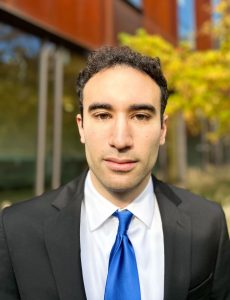Postdoctoral fellows are academia’s problem solvers. They embody the best characteristics of both senior graduate students and junior faculty members. Typically, postdocs embrace shorter-term professional opportunities to grow their own skill sets while helping institutions meet specific research challenges. Essential to most University of Toronto departments, these scholars manage labs, mentor grad students and junior researchers, and design and deliver major research projects with funding they apply for and obtain themselves.

Stanton Hudja is a postdoctoral researcher and manager of the Toronto Experimental Economics Lab (TEEL) housed at the Department of Economics. Over the course of his appointment, he has made significant contributions to both the department and the field of behavioural economics.
“Stanton is an experimental and behavioural economist,” said Professor Yoram Halevy, Director of the TEEL. “In addition to managing the lab and teaching a course in Game Theory he is doing exciting research. In his job market paper, he experimentally investigates decision makers’ attitudes to unknown outcomes. Using a novel experimental technique of eliciting conditional valuations, he can study how the probability of getting an unknown outcome and the payment in the complementary event affect subjects’ valuation. This is a novel foundational study in an area that has not been explored experimentally before.”
Stanton answered questions about the role of postdoc and what he’s learned from it.
Question: From undergraduate to post-doc, you’ve been building your academic foundations at a variety of universities across North America. How has that broad exposure influenced your approach to economics as a discipline?
Answer: There is a lot of heterogeneity in how researchers think about economics. I believe that my experiences have made it easier for me to make connections between different strands of research. Additionally, I think these experiences have allowed me to take a more comprehensive approach towards addressing an economic question.
Q: What attracted you to the Department of Economics at here at the University of Toronto? How has your post doc position here helped you to advance your research interests?
A: I knew that the Economics Department at the University of Toronto would provide an incredible opportunity to develop further as a researcher. The research done at the University of Toronto is extremely insightful and addresses fundamental questions in economics. These are traits that I wanted to further develop in my own research. I believe I have learned much from many people in my time here. I would especially like to mention Yoram Halevy, who has been an excellent resource and mentor throughout the last couple of years. It has been a great experience getting to discuss economics and research with him.
Q: You are the current manager of the Toronto Experimental Economics Laboratory. Could you describe what the lab does and what you do there?
Response: The lab is used by both faculty and graduate students to conduct economic experiments. The facility allows researchers to address questions through randomization of subjects into treatments, which provides a clean way of addressing economic questions. I help to maintain the lab by recruiting subjects and by helping to run economic experiments. There is a variety of research that is done in the experimental economics laboratory. I’ve currently been working on topics related to uncertainty.
Q: You’ve been teaching undergraduate game theory here at UofT. How has that experience informed your teaching philosophies and approaches?
A: Teaching undergraduate applied game theory has been a wonderful experience. It is a course that I think is enjoyable for students and I’m able to incorporate game theoretic experiments in class to better highlight the teaching material. The experiences that I’ve gained from my students have helped me better develop as an instructor and researcher. I always find it useful to teach a new course or use an innovative approach towards teaching students.
Q: You have an extensive list of co-authors for someone the early career stages of their career and have worked in collaboration with numerous research teams. What are the qualities great teams support in each other?
A: I think that team success requires trust. Research is often conducted in groups where coauthors are in different time zones and/or countries. In these cases, it is especially important to be able to trust your coauthors when delegating work. I have been extremely grateful to have coauthors that are incredibly insightful and diligent.
Return to the Department of Economics website.
Scroll more news.
